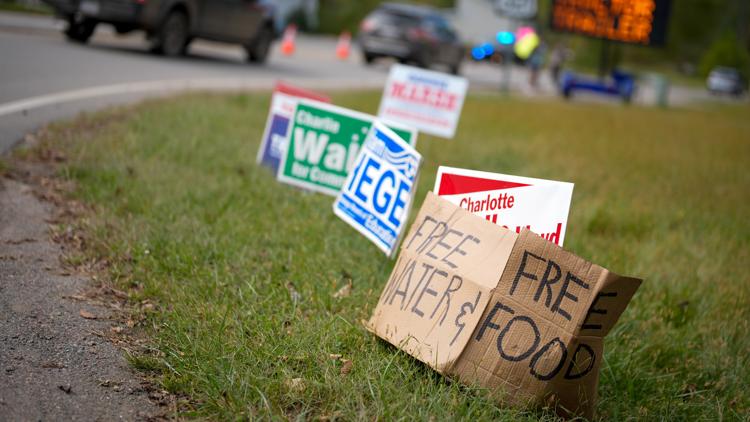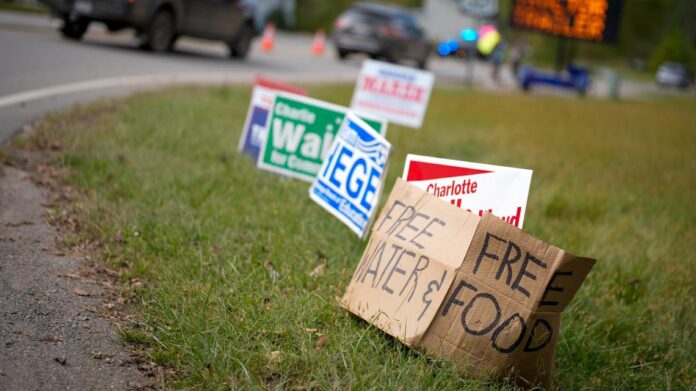
The North Carolina State Board of Elections unanimously passed an emergency resolution to help voters cast ballots in the 2024 election after Helene’s devastation.
RALEIGH, N.C. — Voters in western North Carolina impacted by Hurricane Helene’s devastation may see several changes to how they can cast their ballots in the coming weeks after the state’s election board approved an emergency resolution that modifies voting rules.
The resolution unanimously passed by the North Carolina State Board of Elections, which has both Democratic and Republican members, on Monday comes less than two weeks after Helene destroyed large swaths of western North Carolina — displacing residents, damaging homes and washing away roads.
In a critical presidential election that may hinge on which way the battleground state swings, that widespread disruption also presents major problems for how residents can cast their votes by Nov. 5.
Still, the board reiterated several times during Monday’s meeting that it was committed to ensuring early voting and Election Day happens on schedule across the state, while also making sure “no one is denied the right to vote because of these logistical problems,” said board chairman Alan Hirsch, who is a Democrat.
“I’m generally very hesitant to make changes to the normal running of our election,” said Republican member Stacy Eggers IV, who is from Boone in western North Carolina. “But these have been tailored to give flexibility to the county boards to meet those specific needs.”
The resolution outlines 13 counties in western North Carolina that have polling places or mailing services that were “severely disrupted” by Helene, either because of damage, inaccessibility, using locations for disaster relief or lack of staff. As of Monday, all county elections offices were open, executive director Karen Brinson Bell said.
Approximately 10 early voting sites in the affected counties reported significant damage, accessibility issues or unknown conditions, general counsel Paul Cox said. The state board is also working with emergency management officials to bring in temporary voting facilities, Bell told reporters on Monday.
One of the biggest changes in the resolution allows voters impacted by Helene to turn in absentee ballots by 7:30 p.m. to Election Day polling places operated by their county elections board. Displaced voters may also turn in ballots to another county’s elections board by the same deadline. Previously, voters could turn in absentee ballots to early voting sites in their county or to their county elections board by Election Day.
RELATED: Harris calls Trump ‘incredibly irresponsible’ for spreading misinformation about Helene response
The resolution also expands opportunities to pick up an absentee ballot in-person from a county elections office until the day before the election.
Absentee ballot distribution already faced issues before Helene hit North Carolina. A legal battle over whether to include Robert F. Kennedy Jr.’s name on ballots after he suspended his presidential campaign — which ultimately resulted in taking off his name and reprinting ballots — caused about a two-week delay in September.
With a bipartisan majority vote, county elections boards in the affected areas can approve several changes to Election Day polling locations. Measures that could be considered — which need approval from the state board’s executive director — include transferring voters to other in-county precincts, creating out-of-precinct polling locations in other counties and establishing multiple voting locations within a precinct.
Similarly, those boards can also make changes to early voting sites affected by the storm. Those modifications can include adding new sites or removing ones that are inaccessible, as well as adjusting site hours.
Voters in the area must be notified of changes by mail, according to the resolution. Boards must also share the changes with local media, county political parties and on their county website.
To address a potential lack of poll workers, counties are authorized to select election officials from other counties who are registered to vote in North Carolina. Assistance teams may also be deployed to emergency relief shelters to help voters with absentee voting.
Despite calls from civil rights groups to extend voter registration deadlines in states impacted by Helene, the resolution didn’t include a measure to do so. That decision, along with possible adjustments to what the state board approved, will be left to the state legislature to consider when it reconvenes on Wednesday to pass disaster relief legislation. Bell said the state board has made a $2 million funding request to state lawmakers to support voting changes in the impacted counties.
North Carolina’s voter registration deadline is Friday.
South Carolina took action last week to extend its voter registration deadline to Oct. 14. In Georgia, elections officials have said they don’t anticipate major election disruptions from the storm. Florida is still on track for its Monday voter registration deadline, even with another major hurricane, Milton, expected to make landfall later this week.
In the coming weeks, Bell said the board may need to consider further actions as the affected counties continue to experience disruptions through Election Day.



